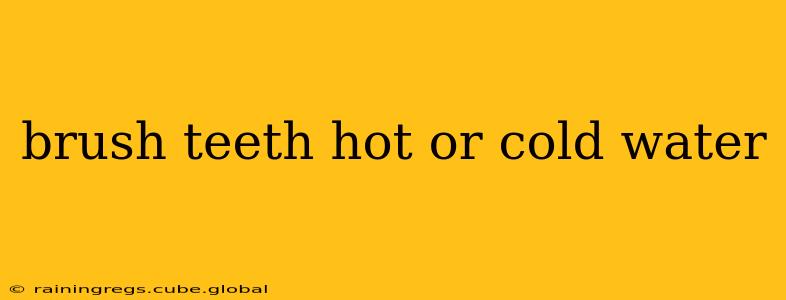The age-old question: is it better to brush your teeth with hot water or cold water? The truth is, there's no definitive "better" option, as the ideal water temperature for brushing comes down to personal preference and individual sensitivities. However, understanding the pros and cons of each can help you choose the best approach for your oral hygiene routine. Let's dive into the details.
What Happens When You Brush Your Teeth With Hot Water?
Brushing with hot water might feel incredibly pleasant, especially in the morning or after a long day. However, excessively hot water can be detrimental to your oral health. Here's why:
-
Damages Enamel: Hot water can weaken your tooth enamel, making your teeth more susceptible to cavities and sensitivity. The heat can actually cause micro-cracks in the enamel's surface over time.
-
Burns the Gums: Scalding water can easily burn your sensitive gum tissue, leading to discomfort, inflammation, and potentially increasing your risk of gum disease.
-
Reduces Effectiveness of Toothpaste: Some toothpastes contain ingredients that are sensitive to temperature. Hot water could potentially reduce the effectiveness of these active ingredients designed to fight plaque and bacteria.
What Happens When You Brush Your Teeth With Cold Water?
Cold water, on the other hand, is generally considered the safer and more effective option for brushing your teeth. Here's why:
-
Strengthens Enamel: Cold water is less likely to damage your tooth enamel, maintaining its protective layer and reducing the risk of sensitivity.
-
Soothes Sensitive Gums: Cold water can help soothe inflamed gums, providing a refreshing feeling while minimizing irritation.
-
Improves Toothpaste Effectiveness: Cold water doesn't negatively impact the active ingredients in your toothpaste, ensuring optimal efficacy in plaque removal and cavity prevention.
-
Helps Close Tooth Pores: While not scientifically proven to a significant extent, some believe that cold water can help to temporarily close the pores in your teeth, making them less prone to staining.
Is Lukewarm Water the Best Option?
Many dentists recommend lukewarm water as the ideal temperature for brushing. It provides a comfortable experience without the potential risks associated with extremely hot water or the slight discomfort that some may experience with very cold water. It offers a middle ground that balances comfort and effectiveness.
What Temperature Water Should I Use to Brush My Teeth?
Ultimately, the best water temperature for you depends on your personal comfort level and any sensitivities you might have. Experiment with different temperatures to find what feels most comfortable and refreshing. If you experience any discomfort, such as burning or sensitivity, opt for a cooler temperature.
Can Hot Water Help With Toothaches?
While a warm, not hot, mouth rinse might provide temporary relief from a toothache, it shouldn't replace professional dental care. A warm salt water rinse can help soothe discomfort but won't address the underlying cause of the pain. See your dentist for diagnosis and treatment.
Does the Water Temperature Affect the Effectiveness of Mouthwash?
The effectiveness of mouthwash isn't significantly impacted by the temperature of the water you use to rinse. However, many people find a cool or lukewarm rinse more refreshing.
Conclusion: Find Your Ideal Temperature
The ideal water temperature for brushing your teeth is a matter of personal preference. While cold water is generally considered safer and more effective, lukewarm water is also a good option. Avoid using excessively hot water, as it can damage your enamel and irritate your gums. Listen to your body, find your comfort zone, and remember that consistent brushing with fluoride toothpaste is key to maintaining optimal oral health, regardless of the water temperature you choose.
